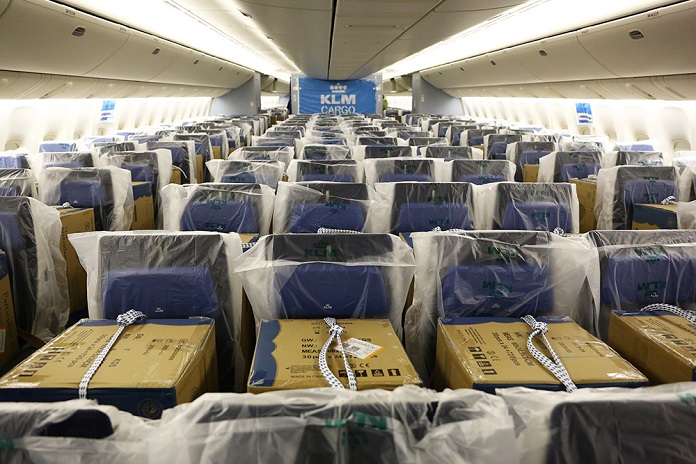
The aviation agency says the temporary rule change is no longer needed to support global commerce
European aviation regulators said they won’t extend a safety exemption allowing airlines to carry critical supplies in the passenger cabin to make up for capacity lost when the pandemic closed down most commercial flights.
“The logistical challenges that arose in 2020 as a result of the COVID-19 crisis no longer exist to the same extent,” the European Union Aviation Safety Agency (EASA) said. The permission for cabin cargo expires on July 31.
EASA was one of the first civil aviation authorities to exempt airlines from requirements to submit a supplemental type certificate for proposed structural modifications or changes to the approved use of aircraft systems. A large number of airlines repurposed a portion of their grounded fleets for dedicated cargo-only flights to take advantage of high demand and rates. An early driver of passenger freighters was the urgent need for COVID medical supplies and protective equipment.
The waivers allowed airlines to fly with light cargo in the seats, overhead bins, and storage areas, or even to remove seats for floor-loading boxes in the entire cabin, during a period of depressed passenger demand and undersupply of freight transport. Regulators supported the change to help keep supply chains functioning and airlines survive with most revenue cut off.
The Federal Aviation Administration’s exemption to carry cargo in the cabin when passengers aren’t present expired at the end of 2021. Most U.S. carriers made limited use of the temporary flexibility, preferring to carry most loads entirely in the lower hold because of the extra personnel and time required to handload individual boxes through the narrow passenger doors and secure them. Handling containerized freight, which is possible with main-deck freighters and the lower hold of large passenger aircraft, is much more efficient.
Airfreight capacity has not fully recovered from the pull-down of passenger traffic two years ago, but the market is no longer in crisis. There is about 14% less cargo space on aircraft today than in 2019 because passenger airlines have yet to return to full passenger operations, especially for international business. Almost 60% of the available space for cargo comes in the belly of passenger aircraft, with all-cargo jets providing the rest of the space.
Several airlines are seeking EASA approval for permanent design changes to fly passenger aircraft in dedicated cargo operations with the seats removed. Those modifications are more involved and meet standard safety requirements, unlike the temporary exemptions.










